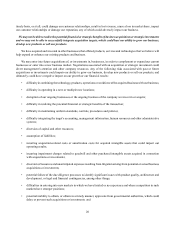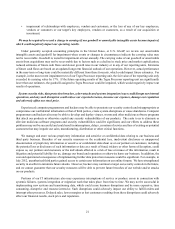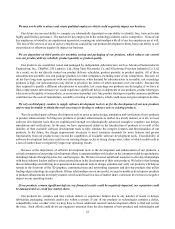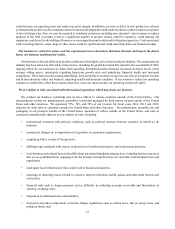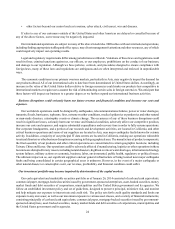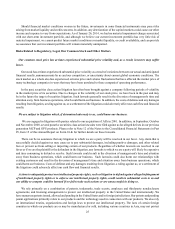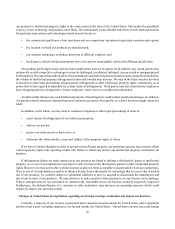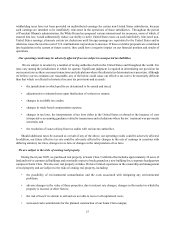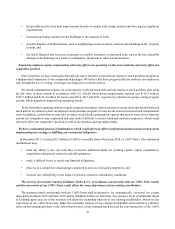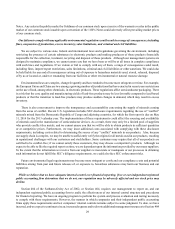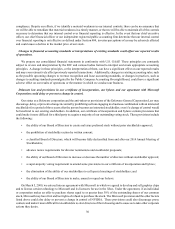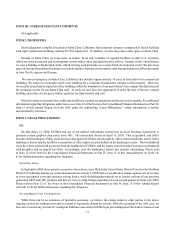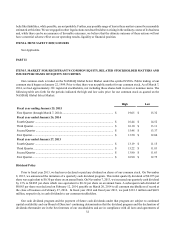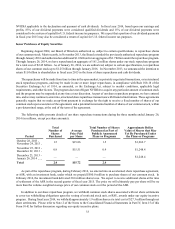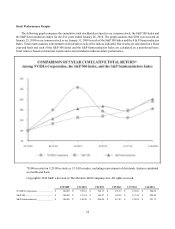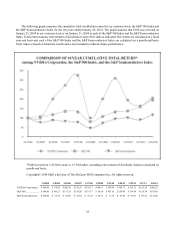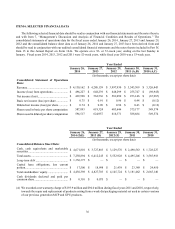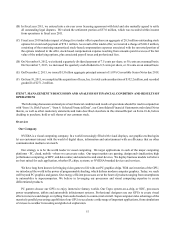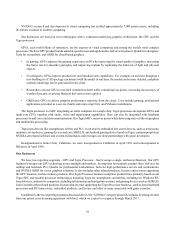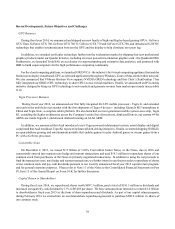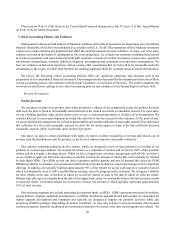NVIDIA 2013 Annual Report Download - page 174
Download and view the complete annual report
Please find page 174 of the 2013 NVIDIA annual report below. You can navigate through the pages in the report by either clicking on the pages listed below, or by using the keyword search tool below to find specific information within the annual report.30
compliance. Despite our efforts, if we identify a material weakness in our internal controls, there can be no assurance that
we will be able to remediate that material weakness in a timely manner, or that we will be able to maintain all of the controls
necessary to determine that our internal control over financial reporting is effective. In the event that our chief executive
officer, our chief financial officer or our independent registered public accounting firm determine that our internal control
over financial reporting is not effective as defined under Section 404, investor perceptions of us may be adversely affected
and could cause a decline in the market price of our stock.
Changes in financial accounting standards or interpretations of existing standards could affect our reported results
of operations.
We prepare our consolidated financial statements in conformity with U.S. GAAP. These principles are constantly
subject to review and interpretation by the SEC and various bodies formed to interpret and create appropriate accounting
principles. A change in these principles, or the interpretation of them, can have a significant effect on our reported results
and may even retroactively affect previously reported transactions. Additionally, changes in existing accounting rules, such
as the possible upcoming changes to revenue recognition and lease accounting standards, or changes in practices, such as
changes to auditing standards promulgated by the Public Company Accounting Oversight Board, could have a significant
adverse effect on our results of operations or the manner in which we conduct our business.
Delaware law and provisions in our certificate of incorporation, our bylaws and our agreement with Microsoft
Corporation could delay or prevent a change in control.
Our status as a Delaware corporation and the anti-takeover provisions of the Delaware General Corporation Law may
discourage, delay, or prevent a change in control by prohibiting us from engaging in a business combination with an interested
stockholder for a period of three years after the person becomes an interested stockholder, even if a change of control would
be beneficial to our existing stockholders. In addition, our certificate of incorporation and bylaws contain provisions that
could make it more difficult for a third party to acquire a majority of our outstanding voting stock. These provisions include
the following:
• the ability of our Board of Directors to create and issue preferred stock without prior stockholder approval;
• the prohibition of stockholder action by written consent;
• a classified Board of Directors, which will become fully declassified from and after our 2014 Annual Meeting of
Stockholders;
• advance notice requirements for director nominations and stockholder proposals;
• the ability of our Board of Directors to increase or decrease the number of directors without stockholder approval;
• a super-majority voting requirement to amend some provisions in our certificate of incorporation and bylaws;
• the elimination of the ability of our stockholders to call special meetings of stockholders; and
• the ability of our Board of Directors to make, amend or repeal our bylaws.
On March 5, 2000, we entered into an agreement with Microsoft in which we agreed to develop and sell graphics chips
and to license certain technology to Microsoft and its licensees for use in the Xbox. Under the agreement, if an individual
or corporation makes an offer to purchase shares equal to or greater than 30% of the outstanding shares of our common
stock, Microsoft may have first and last rights of refusal to purchase the stock. The Microsoft provision and the other factors
listed above could also delay or prevent a change in control of NVIDIA. These provisions could also discourage proxy
contests and make it more difficult for stockholders to elect directors of their choosing and to cause us to take other corporate
actions they desire.


